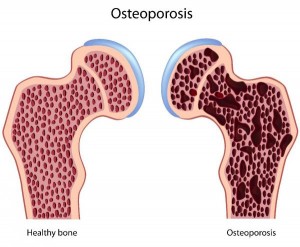Vitamin K is in fact a group of fat soluble vitamins known as naphthoquinones. Vitamin K1 is involved predominantly in blood clotting and vitamin K2 in bone health, as well as a few other things. Recently, higher intakes of vitamin K2, but not K1, have been associated with a reduced risk of prostate cancer. These findings of the EPIC study (i.e. the European Prospective Investigation into Cancer and Nutrition, which is an epic study regardless of its acronym) have focused attention on the differences between the forms of vitamin K. Some researchers are even beginning to insist on K1 and K2 being seen as different vitamins altogether.
Vitamin K2 and Bone Health
When it comes to bone health, it seems that K2 (menaquinone) is the active form of the vitamin that influences proteins like osteocalcin that faciliatate the incorporation of calcium into bone. Low intakes of vitamin K2 have been associated with an increased risk of fracture and while most adults are recommended to get 90mcg per day of vitamin K, those with osteoporosis may need more as this vitamin also helps reduce bone loss.
Osteocalcin levels are routinely used as a biological marker for bone mineral density, and carboxylated osteocalcin can indicate vitamin K status better than carboxylated prothrombin (a protein involved in blood-clotting).
Benefits of Vitamin K2
Vitamin K2 also appears to play a role in the health of skin and brain function, as well as being protective against cancer and supporting growth and development. Vitamin K1 is the form used preferentially by the liver to activate proteins involved in blood clotting, but vitamin K2 is the form used in the appropriate deposition of calcium around the body.
As such, it appears that it is only vitamin K2 intake that correlates with a reduced risk of heart disease via the mechanism of reduced artery calcification. In a large Dutch study, people in the highest third of vitamin K2 intake were 52% less likely to have arterial calcification, 41% less likely to develop heart disease and 57% less likely to die of heart disease (Geleijnse et al., 2004).
K1 to K2 Conversion
Vitamin K1 (phylloquinone) can be converted into K2 in the body but the process is somewhat inefficient so K1:K2 isn’t a 1:1 ratio in terms of intake and K2 status. Levels of vitamin K1 are about ten times higher in the average diet than K2, prompting the USDA to finally (in 2006) investigate levels of K2 in foodstuffs. Unfortunately, this only included meat, dairy, and fast foods, with not a single mention of vegetables or fresh wholefoods as a source of vitamin K.
There is also a synthetic form of vitamin K, K3 or menadione, but this is not needed for health and may actually be detrimental to health in some cases.
Vitamin K and Blood-Clotting
Vitamin K deficiency is pretty rare but can occur where absorption is impaired or where antibiotics are used long-term. Deficiency signs and symptoms include problems with bleeding and bruising. In fact, in many countries, newborns are given a vitamin K shot shortly after birth to reduce the risk of haemorrhagic disease, which can be fatal.
Because of the effects of vitamin K on blood clotting it is not advisable that anyone taking a stable dose of anticoagulants begin to supplement with vitamin K or dramatically increase the levels of vitamin K in their diet without first consulting with their physician. Many anticoagulants work by antagonising vitamin K in order to thin the blood. Many physicians will provide a list of foodstuffs that should be avoided when taking these types of blood-thinning medications, most of which are animal-derived foods, aside from the vegan-friendly ones listed below.
It is interesting that antibiotics can affect vitamin K status because for a long time it was thought that bacteria in the intestine were the major contributor of vitamin K in the body. In recent years, however, research has shown that the majority of vitamin K2 produced by these bacteria is not bioavailable as it is contained with bacterial membranes.
Vegan Sources of Vitamin K
Diet is, therefore, the main source of vitamin K, with vegan sources of vitmain K1 including:
- Green leafy vegetables:
- chard
- kale
- spinach
- turnip greens
- collards
- mustard greens
- parsley
- romaine, and green leaf lettuce
- Vegetables:
- Brussels sprouts
- broccoli
- cauliflower
- cabbage
- Fruits:
- Avocado
- Kiwi
- Cereals
The Best Vegan Sources of K2
Fermented foods (such as sauerkraut and natto) are, however, vegan-friendly sources of ready-made vitamin K2. In fact, the vitamin K2 found in natto is in the form of menaquinone-7, the most active form when it comes to increasing levels of osteocalcin (a bone-building protein). The vitamin K2 in meat, eggs, and dairy is menaquinone-4 (MK-4) which is less active than MK-7.
MK-7 has a longer half-life, stays in the body longer and is more active in building new bone than MK-4 and K1. Specifically, it helps with bone mineralisation and can reduce the number and activity of osteoclasts, preventing bone being broken down as fast.
Safety First
Because of the potential for vitamin K to affect blood clotting, anyone considering a supplement should first consult their physician, especially if they are taking anticoagulants or have a bleeding disorder. Most vegan supplements will contain K2 (menaquinone) from fermented sources, as opposed to vitamin K1, but Theuwissen, et al., 2013, recently noted that even a dose as low as 10mcg of K2 could disrupt antiocoagulant therapy, so it’s wise to talk to a health care practitioner prior to starting any new supplements, rather than self-medicating, particularly in the case of a serious disease like osteoporosis.
References for vitamin K2 and bone health
Theuwissen E1, Teunissen KJ, Spronk HM, Hamulyák K, Ten Cate H, Shearer MJ, Vermeer C, Schurgers LJ. Effect of low-dose supplements of menaquinone-7 (vitamin K2 ) on the stability of oral anticoagulant treatment: dose-response relationship in healthy volunteers. J Thromb Haemost. 2013 Jun;11(6):1085-92. doi: 10.1111/jth.12203.
Knapen MH1, Drummen NE, Smit E, Vermeer C, Theuwissen E. Three-year low-dose menaquinone-7 supplementation helps decrease bone loss in healthy postmenopausal women. Osteoporos Int. 2013 Sep;24(9):2499-507. doi: 10.1007/s00198-013-2325-6. Epub 2013 Mar 23.
Geleijnse JM1, Vermeer C, Grobbee DE, Schurgers LJ, Knapen MH, van der Meer IM, Hofman A, Witteman JC. Dietary intake of menaquinone is associated with a reduced risk of coronary heart disease: the Rotterdam Study. J Nutr. 2004 Nov;134(11):3100-5.
Nimptsch K1, Rohrmann S, Linseisen J. Dietary intake of vitamin K and risk of prostate cancer in the Heidelberg cohort of the European Prospective Investigation into Cancer and Nutrition (EPIC-Heidelberg). Am J Clin Nutr. 2008 Apr;87(4):985-92.
 Want carbon-neutral webhosting with great customer service? Try DreamHost and use code 'Vegans' for a third off!
Want carbon-neutral webhosting with great customer service? Try DreamHost and use code 'Vegans' for a third off!





{ 1 comment… read it below or add one }
Interesting. The veggies I eat for calcium (leafy greens and such) are the ones that have vitamin k too! That pic of natto is pretty gross though. I guess it must look delicious to others though! My mom and sis LOVE it. I only tried it once and..I thought I was going to puke. Couldn’t brush out my mouth fast enough! lol